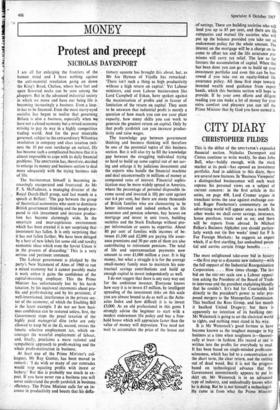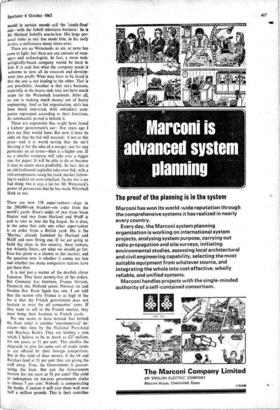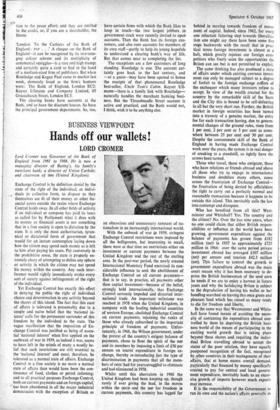CITY DIARY
CHRISTOPHER FILDES
This is the debut of the SPECTATOR'S expanded financial section. Nicholas Davenport and Custos continue to write weekly. So does John Bull, who—boldly enough, with the stock market at its peak—has opened an investment portfolio. And in addition to this diary, there are several new features. In 'Business Viewpoint' a distinguished businessman will each week express his personal views on a subject of current concern : in the first article in this series, on page 408, Lord Cromer argues in trenchant terms the case against exchange con- trol. Roger Pemberton's commentary on the advertising world will appear once a month. In other weeks we shall cover savings, insurance, house purchase, trusts and so on; and there will be reports from abroad. In Michael ffolkes's Business Alphabet you should particu- larly watch out (in five weeks' time) for F Is For Foreign Markets: he suggests an export which, if at first startling, has undoubted poten- tial and carries certain fringe benefits . . .
The most enlightened take-over bid in history —the first step to a dynamic new industry—with the full support of the Industrial Reorganisation Corporation. . . . How times change. The last bid on the GEC-AEI scale saw a Labour opposi- tion asking the President of the Board of Trade to intervene and the president explaining blandly that he couldn't. Ices bid for Courtaulds led directly to the president's power to refer pro- posed mergers to the Monopolies Commission. This baulked the Ross Group, and last month it baulked United Drapery; but there is apparently no intention of its baulking GEC. Mr Weinstock is going to set the electrical world to rights, and nothing must stand in his way.
It is Mr Weinstock's good fortune to have become known as the toughest manager in big business at a time when toughness is—theoreti- cally at least—in fashion. His record at GEC is written into the profits for everybody to read. It has been based on single-minded profit-con- sciousness, which has led to a concentration on the short term, the clear return, and the cutting out of dead wood. But it is not the progress based on technological advance that the Government intermittently appears to put its shirt on. Mr Weinstock is in an advanced type of industry, and undoubtedly knows what he is doing. But he is not himself a technologist. He came in from what the Prime Minister would in certain moods call the 'candy-Boss' side—with the Sobel! television. business: he is Mr. Michael Sobeilts son-in-law. His large per- sonal stake in GEC has made him, in his early forties, a millionaire many times over.
There are no Weinstocks in AEI, or none has come to light; but there are any amount of man- agers and technologists. In fact, a more tech- nologically-based company would be hard to find. It is said that what the company needs is someone to turn all its research and develop- ment into profit. What may have to be faced is that the one is not leading to, the other. That is one possibility. Another is that AEI'S business, especially at the heavy end, may not have much scope for the Weinstock treatment. After all, no one is making much money out of heavy engineering. And as for organisation, AEI'S has been much improved, with subsidiary com- panies regrouped according to their functions. Its ramshackle periodis behind it.
These are arguments that might have found a Labour government's ear: five years ago I dare say they would have. But now it must be odds on that the bid will succeed: if not at this price—and it is worth noting that the arc's blessing is for the idea of a merger, not for any particular set of terms—then at a higher one. If so, a smaller company will take over a bigger one, for paper. It will be able to do so because it uses its assets more profitably. In fact, this is an old-fashioned capitalist take-over bid, with a rich entrepreneur using his stock market follow- ing to exploit an asset situgion. To me this is no bad thing; but it says a lot for Mr Weinstock's power'of persuasion thathe has made Whitehall think so too.
There are now 138 super-tankers—ships in the. 200,000-ton bracket—on order from the world's yards. Esso's order of two from Swan Hunter and two from Harland and Wolff is said to take us into the big league. So it does, in the sense that only one other super-tanker is on order from a British yard. She is the 'Mysina; already launched by Harland and Wolff and now fitting out. If we are going to build big ships in this country, these tankers, not Atlantic liners, are what we should go for. Esso has given us a chance in this market, and the question now is whether it comes too late and whether too many competitor nations have got there first.
It is not just a matter of the devilish clever Japanese. They have seventy-five of the orders. But Germany has fourteen, France thirteen, Denmark ten, Holland seven, Norway six and Sweden five. Even Spain has one. I am told that the reason why France is so high in the list is that the French government does not hesitate to twist the oil companies' arms. If they want to sell in the French market, they must bring their business to French yards.
No one seems to have noticed that behind the Esso order is another 'uncommercial' de- cision—this time by the National Provincial and Barclays Banks. They are lending a sum which I believe to be as much as £27 million, for ten years, at 5-1 per cent. This enables the shipyards to give the same sort of credit terms as are offered by their foreign competitors. But in this land of dear money, if the NP and Barclays lend at 5f per cent they are giving the stuff away. True, the Government is guaran- teeing the loan. But can the Government borrow for ten ytars at 5+ per cent? The yield to redemption on ten-year government stocks is almost 7 per cent. Nobody is compensating the banks. I reckon it will cost them well over half-a million pounds. This is their contribu-
tion to the peace effort; and they are entitled to the credit, or, if you are a shareholder, the blame.
`London. To the Cashiers of the Bank of England : PAY . . .' A cheque on the Bank of England—it can be recognised by its two-tone- grey colour scheme and its multiplicity of ornamental squiggles—is a rare and high trump; and certainly quite a card to find in the hand of a medium-sized firm of publishers. But when Routledge and Kegan Paul came to market last week, demurely listed as the firm's bankers were: The Bank of England, London EC2; Keyser Ullmann and Company Limited, 85 Gracechurch Street, London EC3.
The clearing banks have accounts at the Bank, and so have the discount houses. So have the principal government departments. So, too, have certain firms with which the Bank likes to keep in touch—the two largest jobbers in government stock were recently invited to open accounts. Then the Bank has its foreign cus- tomers, and also runs accounts for members of its own staff—partly to help its young hopefuls to understand a clearing bank's way of life. But that comes near to completing the list.
The exceptions are a few customers of long standing. Routledge is one. The account cer- tainly goes back to the last century, and —at a guess—may have been opened to house the receipts of that phenomenal Routledge best-seller, Uncle Tom's Cabin. Keyser Ull- mann—there is a family link with Routledge- naturally handles the merchant banking busi- ness. But the Threadneedle Street account is active and practical, and the Bank would not, I think, wish it to be anything else.




































 Previous page
Previous page